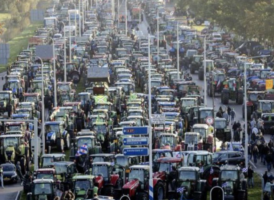Food Innovation Hubs (FUBs) are being set up all over the world for the “transformation of food systems”. In November 2020, the World Economic Forum announced that the European Food Innovation Hub will be located in Wageningen, in the Netherlands.
Prime Minister Rutte announced last year that his country would invest in the Global Coordinating Secretariat of the Food Innovation Hubs. This secretariat will also operate from Wageningen.
But why do we need these centers? WEF, no less. Under the guise of ‘fair prices for farmers’, (good) citizens are made dependent on the WEF for their food supply.
This how the WEF describes the hubs:
Worldwide, nearly 2 billion people lack access to sufficient, nutritious and safe food and 690 million people suffer from chronic hunger or lack of proper nutrition. Current food system needs to produce much more food, whilst already now planetary boundaries are being crossed. The Food Innovation Hubs initiative catalyzed by the World Economic Forum with public, private and civil society partners is a call to action for a locally driven program, enabling innovations to sustainably improve the way we produce and consume food, through an eco-systems approach.
Our food systems must become more sustainable, efficient, inclusive, and deliver more nutritious and healthy food. Innovations that can help transform our food systems are often already out there. Unfortunately, the adoption and scale-up of innovations in the agri-food sector lags behind other sectors. Collaboration between the different stakeholders, who are working from ‘farm to fork’ is key.
That is why World Economic Forum and partners have initiated Food Innovation Hubs across the globe. Food Innovation Hubs are a multistakeholder, precompetitive and market-based partnership platform aimed at strengthening local innovation ecosystems to sustainably scale innovative solutions for food systems transformation.
What they actually mean (I paraphrase):
We will dictate how, how much, where and when you will grow crops and we will decide how they are distributed. We are particularly spun up over nitrogen because sometimes it gets in waterways and causes temporary problems like impacts on drinking water, ecosystem shifts, algal blooms, with some effects on the local economy and potentially human and animal health.
They got the EU to go along with their madness. As with most western political entities it is infested with WEF alumni.
After politicians’ decision to close dozens of farms and cattle ranches to reduce nitrogen to comply with absurd EU regulations on nitrogen pollution, the angry Dutch farmers have issued an ultimatum threatening to block the country’s airports, ports and distribution centers. pic.twitter.com/q4zcmI1PjU
— RadioGenova (@RadioGenova) July 1, 2022
The Dutch government was surprisingly honest about their treachery: “The honest message is that not all farmers can continue their business.” So, some very pissed off farmers showed up at the Minister for Nitrogen and Nature Policy’s (it’s a thing) offices and sprayed manure on them. It was a massive demonstration and follows in the wake of another in Pakistan. Maybe, slowly the first and second worlds are waking up to the fact the WEF is not a good thing for them. The WEF’s dressing up of their greed and lust for power in a message of “protection” for the Earth is beginning to wear thin. And the people most affected are beginning to fight back.
Dutch Farmers at it again going After newly elected Minister of Nature and Nitrogen who is killing their farms They are using their own equipment to spray up and over his house manure pic.twitter.com/86hJoa2iHQ
— Kathy Miller (@alwayseektruth) July 3, 2022
Oh, and it’s happening here. Cue the useful idiots and WEF alums…
The Water Environment Federation (WEF), in collaboration with the U.S. Environmental Protection Agency (EPA), has launched the NutrientSmart (NSmart) program to help reduce nutrient loadings in waterways and recognize the water utilities that are leaders and innovators.
NSmart will begin as a pilot program and encourage the adoption of enhanced nutrient management practices by water utilities and distribute information on tools and methods for lowering nutrients. More here…
